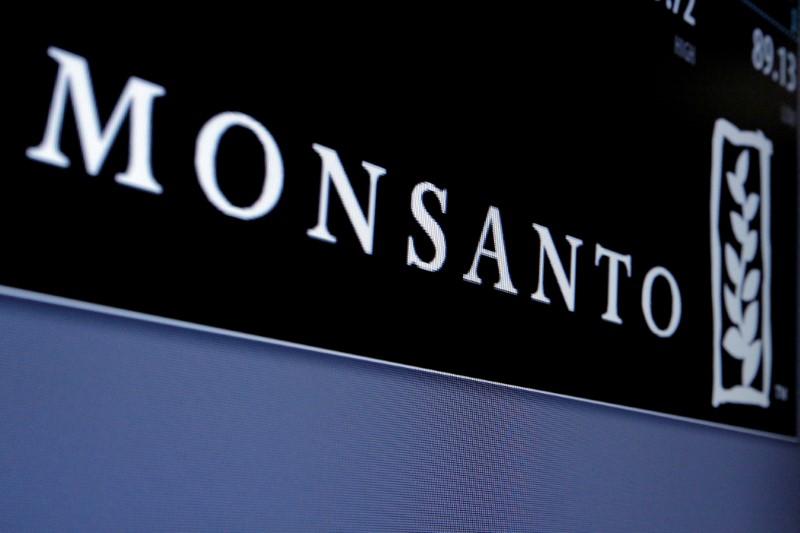French Court Cancels Monsanto Weedkiller Permit on Safety Grounds
EUROPE, ENVIRONMENT, ORGANIC, GMO, GENETIC ENGINEERING, 21 Jan 2019
Reuters – TRANSCEND Media Service
15 Jan 2019 – A French court canceled the license for one of Monsanto’s glyphosate-based weedkillers today over safety concerns, placing an immediate ban on Roundup Pro 360 in the latest legal blow to the Bayer-owned business.

FILE PHOTO: Monsanto is displayed on a screen where the stock is traded on the floor of the New York Stock Exchange (NYSE) in New York City, U.S. on May 9, 2016.
REUTERS/Brendan McDermid/File Photo
Germany’s Bayer, which bought Monsanto for $63 billion last year, faces thousands of U.S. lawsuits by people who say its Roundup and Ranger Pro products caused their cancer.
A court in Lyon in southeast France ruled that the approval granted by French environment agency ANSES in 2017 for Roundup Pro 360 had failed to take into account potential health risks.
Bayer, which said it disagreed with the decision and was considering its legal options, has cited regulatory rulings as well as scientific studies that found glyphosate to be safe.
The firm is appealing a first U.S. court ruling that awarded $78 million in damages to a school groundskeeper from California.
“Bayer disagrees with the decision taken by the Administrative Court of Lyon to cancel the marketing authorization for RoundUp Pro 360,” it said in a statement.
“This product formulation, like all crop protection products, has been subject to a strict evaluation by the French authorities (ANSES), an independent body and guarantor of the public health security.”
Glyphosate, which is off-patent and marketed worldwide by dozens of other chemical groups including Syngenta and DowDuPont’s Corteva Agriscience, is due to be phased out in France within three years under a pledge by President Emmanuel Macron, who stopped short of an outright ban.
The French court said ANSES had not respected a precautionary principle in French law, notably by not conducting a specific evaluation of health risks for Roundup Pro 360.
“Despite the European Union’s approval of the active substance (glyphosate), the court considered that scientific studies and animal experiments showed Roundup Pro 360 … is a potentially carcinogenic product for humans, suspected of being toxic for human reproduction and for aquatic organisms,” the court said in a summary of its ruling.
Bernstein analysts said in a note that the financial impact on Bayer of banning RoundUp Pro 360 in France would likely be limited, given it concerned one product in a market for glyphosate-based weedkillers worth around 40 million euros.
The World Health Organisation’s cancer agency concluded in 2015 that glyphosate was probably carcinogenic, an assessment cited by the French court in Tuesday’s ruling.
ANSES said it was still examining the court ruling, but that the decision was effective immediately.
“As a consequence, the sale, distribution and use of RoundUp Pro 360 are banned as of today,” the agency said in an email.
“This is a great first, which must be repeated,” Corinne Lepage, a former French environment minister and member of environment association CRIIGEN that brought the court case, said of the ruling on Twitter.
The association had also contested the process by which the EU renewed the general license for glyphosate, seeking a referral to the European Court of Justice, but the French administrative court said such action was not necessary.
_______________________________________________
Reporting by Sudip Kar-Gupta and Gus Trompiz; Additional reporting by Patricia Weiss; Editing by Ludwig Burger and Alexander Smith
DISCLAIMER: The statements, views and opinions expressed in pieces republished here are solely those of the authors and do not necessarily represent those of TMS. In accordance with title 17 U.S.C. section 107, this material is distributed without profit to those who have expressed a prior interest in receiving the included information for research and educational purposes. TMS has no affiliation whatsoever with the originator of this article nor is TMS endorsed or sponsored by the originator. “GO TO ORIGINAL” links are provided as a convenience to our readers and allow for verification of authenticity. However, as originating pages are often updated by their originating host sites, the versions posted may not match the versions our readers view when clicking the “GO TO ORIGINAL” links. This site contains copyrighted material the use of which has not always been specifically authorized by the copyright owner. We are making such material available in our efforts to advance understanding of environmental, political, human rights, economic, democracy, scientific, and social justice issues, etc. We believe this constitutes a ‘fair use’ of any such copyrighted material as provided for in section 107 of the US Copyright Law. In accordance with Title 17 U.S.C. Section 107, the material on this site is distributed without profit to those who have expressed a prior interest in receiving the included information for research and educational purposes. For more information go to: http://www.law.cornell.edu/uscode/17/107.shtml. If you wish to use copyrighted material from this site for purposes of your own that go beyond ‘fair use’, you must obtain permission from the copyright owner.
Read more
Click here to go to the current weekly digest or pick another article:
EUROPE:
- Germany’s New Political Landscape
- Armenia and Its Diaspora: A Tapestry of Tension and Triumph
- Biological Apocalypse in Armenia Is Not Far Off
ENVIRONMENT:
ORGANIC, GMO, GENETIC ENGINEERING:

